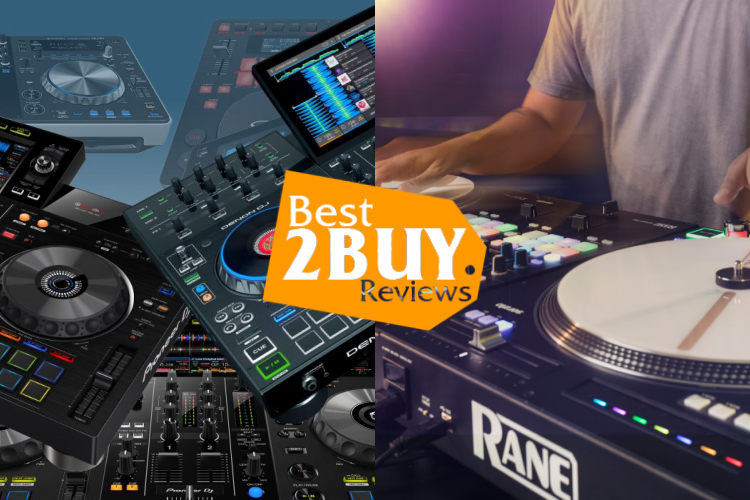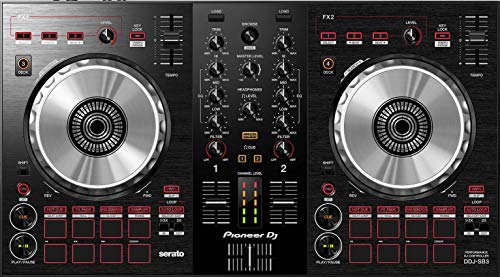Exploring the Rhythm of Innovation: A Comprehensive Guide to DJ Controllers

In the dynamic realm of modern music, DJs stand at the forefront of creating electrifying soundscapes and delivering unforgettable performances. Over the years, the tools of the trade have evolved significantly, with DJ controllers emerging as the heart of this transformation. These innovative devices have revolutionized the way DJs manipulate, mix, and produce music, offering an intuitive and comprehensive platform for both amateurs and professionals alike.
What Is A DJ Controller?
A DJ controller is a tool that empowers DJs to manage and modify digital audio files through physical interfaces. It commonly comprises virtual turntable decks, a mixer, and an array of controls like faders, knobs, and buttons. These controllers are specifically crafted to complement DJ software on a computer, enabling DJs to blend and manipulate digital music files, mimicking the techniques used by traditional DJs handling vinyl records for mixing and scratching.
Understanding Parts Of The DJ Controllers
These are the key components of a DJ controller that you should familiarize yourself with:
- Decks (virtual turntables): Found on a DJ controller, these decks are used to play and manipulate digital audio files. Each deck typically comprises a platter (the spinning part manipulated by the DJ) and a set of buttons and knobs that control various aspects of the track, including pitch, tempo, and effects.
- Crossfader: A sliding control used to blend two different audio tracks, enabling smooth transitions between songs or the mixing of multiple tracks.
- DJ mixer: Serving as the central hub of a DJ controller, this element combines and processes all audio signals from different sources. It usually includes knobs and faders to adjust volume, EQ, and track effects.
- Effects controls: Many DJ controllers feature various built-in effects like echo, reverb, and delay. Dedicated control knobs or buttons are used to apply these effects to the music.
- Audio inputs and outputs: DJ controllers typically offer multiple audio inputs and outputs for connecting various sources such as turntables, CD players, or laptops. These can include line-level inputs, phono inputs, headphones, microphones, and USB ports.
- Transport controls: Consisting of buttons and knobs, these controls manage music playback functions like play, pause, and stop.
- Display: Often, DJ controllers are equipped with a small LCD display that shows information about the current track being played, such as song title, artist, and elapsed time.
- Loop controls: Used to set and manipulate loops within a track, these controls typically involve buttons and knobs.
- Hot cues: Pre-set points within a track that a DJ can swiftly jump to using dedicated buttons on the controller.
- Sampler: Some DJ controllers integrate a built-in sampler allowing DJs to record and play back short music clips on the fly.
- Sync controls: Many DJ controllers include sync controls that automatically match the beats of two different tracks, simplifying the process of mixing them together.
- Wireless connectivity: Modern DJ controllers often come with built-in wireless connectivity such as Bluetooth or WiFi, enabling connections to other devices or the internet.
Types of DJ Controllers
- Entry-Level Controllers: These are designed for beginners and come with basic functionalities. They offer a user-friendly interface and are typically more affordable, making them an ideal starting point for aspiring DJs.
- Mid-Range Controllers: Offering a balance between features and cost, mid-range controllers cater to semi-professionals and enthusiasts. They often include more advanced features, improved build quality, and enhanced performance capabilities.
- High-End Controllers: Geared towards professional DJs, high-end controllers boast top-notch build quality, extensive features, and often incorporate motorized components for a more authentic feel. These controllers are the pinnacle of performance and customization.
Factors To Consider When Choosing A DJ Controller
Choosing the right DJ controller is an essential decision for both novice and experienced DJs. A DJ controller serves as the central hub for controlling music and manipulating sounds during performances, making it a crucial tool for any DJ. With the abundance of options available in the market, selecting the perfect DJ controller can be a challenging task. Factors such as features, connectivity, software compatibility, and budget all play a pivotal role in making the right choice.
Understanding Your Needs
Before diving into the sea of options, it's important to understand your specific requirements. Are you a beginner looking for a simple setup, or a professional seeking advanced features and controls? Consider the style of music you'll be mixing, the venues you'll perform in, and whether you'll be using it primarily for live performances or studio work.
Key Features to Consider
Size and Portability: DJ controllers come in various sizes, from compact and portable units to larger, more feature-packed controllers. Consider your need for portability. If you're constantly on the move, a smaller, lightweight controller might be more suitable. However, if you require more control and features, a larger controller might be necessary despite being less portable.
Number and Type of Decks: The number of decks your controller can handle is significant. Most controllers offer two decks, allowing you to mix two tracks simultaneously. Some advanced controllers offer four decks for more complex mixing. Additionally, ensure the controller supports the type of decks you prefer, whether that's CDJ-style, vinyl, or jog-wheel controllers.
Connectivity: The connectivity options of the DJ controller are crucial. Check for the availability of ports like USB, XLR, RCA, and MIDI to connect to other equipment such as mixers, speakers, and computers. Ensure it's compatible with your existing setup or the setup you intend to build.
Pads, Faders, and Knobs: Consider the number and quality of performance pads, faders, and knobs on the controller. These elements are used for effects, cues, loops, and various other performance controls. Look for a layout that suits your mixing style and provides the necessary control for your preferred techniques.
Software Compatibility: Most DJ controllers come bundled with DJ software. Ensure that the software aligns with your style and skill level. Some controllers are specifically designed for certain software, while others are more versatile and can work with various programs. Check for compatibility and features offered by the software.
Budget: Set a budget before you start looking for a DJ controller. Prices can vary significantly based on the features and brand. While it's essential to get the best value for your money, consider that investing in a high-quality controller can offer better durability and performance in the long run.
Popular DJ Controllers
There are numerous reputable brands that offer quality DJ controllers, including Pioneer DJ, Native Instruments, Numark, Denon DJ, and more. Some popular models across different price ranges include:
- Pioneer DJ DDJ-SB3
- Native Instruments Traktor Kontrol S2
- Numark Mixtrack Platinum FX
- Pioneer DJ DDJ-1000
- Denon DJ Prime 4
Conclusion
DJ controllers have democratized the field of DJing, providing both enthusiasts and professionals a pathway to unleash their creativity and expression. Their user-friendly interfaces, adaptable features, and seamless software integration have significantly influenced the methods of mixing, producing, and presenting music. As technology advances, the forthcoming evolution of DJ controllers anticipates delivering even more inventive and immersive encounters for DJs and their audiences.










